
REGISTRATIONS CLOSED
The 38th edition of the BAM Conference will take place from the 2nd - 6th September 2024 at Nottingham Business School, Nottingham Trent University.
THEME
Achieving transformation for greater good: Societal, organisational and personal barriers and enablers.
The question of how to elicit transformation has assumed a new urgency against a backdrop of intense global competition, the digitisation of work, hybrid working and the promise of the metaverse as well as skill challenges and wider political developments, such as war in Europe. Underlying these political, technological, economic and moral imperatives is growing awareness of ecological precarity given limited and diminishing natural resources. How do organisations, the people they employ and the environments to which they belong, flex, adjust and transform themselves to overcome the manifest challenges they face in these turbulent times?
Sustainability at Conferences
Professor Jan Bebbington, BAM's Vice-Chair for Sustainability, has prepared this brief note to help our community think and talk about sustainability in the context of academic conferences.
The desire to be less unsustainable is prompted by the concern that combined human activities are creating environmental problems that are systemic in nature and that these problems will threaten human wellbeing. At the same time, sustainability concerns also relate to social equity with an ethically-based desire to ensure that all people have the chance to have their needs met. These concerns infuse conference organisation and also the choices made by academics over which conferences to attend.
The following material lays out some of the issues at stake in terms of environmental sustainability at conferences and it should become apparent that it is impossible to easily be categorical about what ‘best’ practice is. Rather this short guide provides ‘points to ponder’ in thinking about conference attendance and organisation.
Attending a conference creates impacts from two sets of activities, namely: getting to the conference and impacts that arise during the conference itself.
Continue reading: Sustainability at Conferences
KEY DATES
- 27th November 2023: Call for Papers & PDWs
- 8th January 2024: Paper/PDW Submission Opens
- 1st March 2024: Paper Submission Closes
- 26th April 2024: Conference Registration Opens
- 26th April 2024: PDW Submission Closes
- Late April 2024: Authors Notified of Paper Acceptance Status
- 7th June 2024: Deadline for at least ONE author of a paper to Register
- 30th June 2024: Final Paper Upload
- 31st July 2024: Deadline for Early Bird Registration
- 16th August 2024: Conference Registration Closes
BAM2023 Conference Highlights
Conference Committee
Chairs
- Professor Lynn Oxborrow, Professor of Sustainable Small Business Growth, Nottingham Trent University (Co-Chair)
- Professor Helen Shipton, Professor of International Human Resource Management, Nottingham Trent University (Co-Chair)
Academic Committee
- Melanie Currie, Deputy Dean, Nottingham Business School
- Dr Mel Bull, Assistant Head of Postgraduate and Executive Education, Nottingham Business School (Sponsorships)
- Prof Jo Richardson, Associate Dean for Research, Nottingham Business School
- Prof Daniel King, Professor of Organization Studies, Nottingham Business School
- Prof Mark Learmonth, Professor of Organization Studies, Nottingham Business School
- Dr Sahar Bakr, Senior Lecturer, Marketing Department, Nottingham Business School
- Dr Zara Whysall, Associate Professor of Business Psychology, Nottingham Business School
- Dr Stefanos Nachmias, Associate Professor and Head of the Department of Management, Nottingham Business School
-
Dr Loyin Olotu-Umoren, Head of School Operations, Nottingham Business School (Chair of the Local Arrangements)
Local Arrangements Committee
-
John Moore, Nottingham Business School
-
Nicola Simpkins, Nottingham Business School
-
Sam Gore, NTU Events and Conferencing
-
Vicky Rivett, Business Development Manager, Nottingham Trent University
-
Rachel Bradley, Events, Hospitality & Catering Officer, Nottingham Trent University
-
Anna Wilcox, Nottingham Trent University
-
Stephen Hillier, Senior Marketing Manager, Nottingham Business School (Publicity Chair)
BAM Representatives
- Justina Senkus, Head of Operations and Events, British Academy of Management
- Lewis Johnson, Conference and Communications Officer, British Academy of Management
